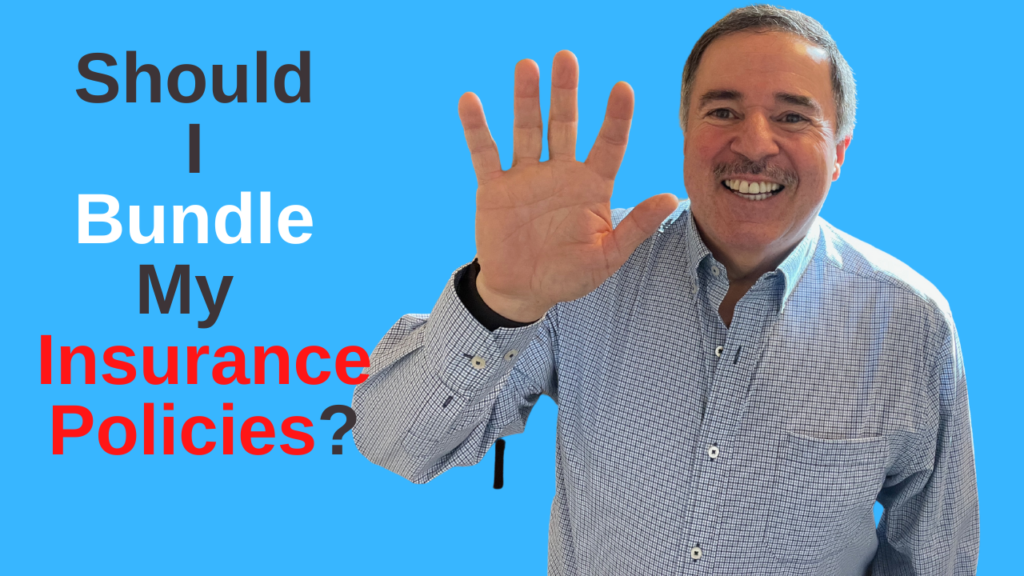Should I Bundle My Insurance Policies?

One way to save money in premiums is by bundling insurance policies together. This is when you use the same provider for all of your insurance needs. It’s kind of like getting a “buy in bulk” discount.
Most providers will offer discounts for bundling policies because it helps them make more money. Essentially, you’re giving insurance providers more business, and to show appreciation, many will have significant discounts.
However, there are times when bundling might not be the best option. This, of course, depends on your provider. In rare instances, bundling could actually cost you more in the long run.
This can depend on a lot of factors, and as I said, it’s not very common.
Why Consider Bundling Your Insurance?
Perhaps the most obvious benefit of bundling insurance is the cost savings. When combing things like home and auto insurance through a single provider, you could save instead of paying higher premiums to two different insurers.
Another element of bundling is the convenience factor. Instead of having two online portals or two completely different agents, everything is often handled from a single point of contact.
It’s simply much easier to manage overall. Especially if one insurer already has all of your needs covered and knows the ins and outs of your situation.
How Much Can Bundling Insurance Save You?
Every insurer is different. How much you save depends on your provider and how they calculate your rates. However, many of the most popular providers will offer anything from 6-23% by bundling insurance policies.
On average, you could possibly save around 14% of your premiums every year. Again, though, this depends greatly on the insurance company.
In any case, it’s worth finding out how much your insurer will discount by bundling. After all, there’s nothing wrong with asking, right?
Can You Bundle Policies Later?
Most insurers will allow you to bundle policies as time marches on. This means that if you buy homeowner’s insurance and then two years later decide to add automobile coverage , you still have access to discounts.
Remember what I said earlier; it’s all about giving the insurer more business.
There might be some who don’t offer the best discounts if any at all. In that case, I suggest calling around to see if you can find a better alternative.
What Happens if You Cancel One of the Policies?
Canceling one of your policies may wind up costing you more money. Obviously, without a “bundle” of different services, you’ll revert back to the normal annual premium.
Then again, this also depends on how many accounts you’ve bundled together. Some companies will bundle home, auto, and life insurance. If you cancel, say, the auto insurance, you might still get the discount since you have home and life insurance policies remaining.
You should contact your provider to find out more information about what you can bundle together.
Why It’s Important To Work With A Local Independent Insurance Broker
While it may be tempting to go with the big national insurance companies, working with a local independent insurance broker can save you money on your insurance. Here’s why:
1. As a local independent broker, we have access to a variety of insurance companies, so we can shop around and get you the best possible insurance rates.
2. Local independent broker, we know the ins and outs of the insurance market in our area, so we can help you find discounts and savings that you might not be aware of.
3. Bundling your insurance policies with a local independent brokercan often save you money. That’s because many insurers offer discounts for bundling multiple policies with the same insurance agency.
4. Working with a local independent broker gives you someone to talk to face-to-face about your coverage needs and concerns. You’re not just a number to us, so we’ll take the time to really understand your situation and find the best coverage for you.
Bundling Insurance Policies Can Save You Money
How much can you save by bundling policies? At Vargas & Vargas Insurance, we’ll help you answer that question by using our network of providers to find the best deals for you. Contact us today to see how much we can help you save by bundling your policies together.
It’s convenient, and it could result in saving quite a bit on your premiums.


